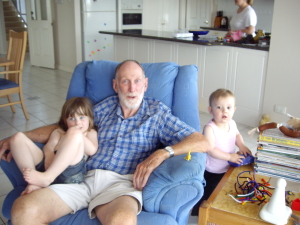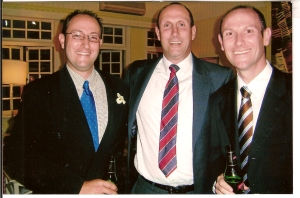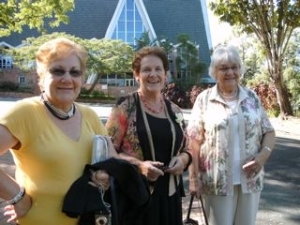Blog 28: Sets and Sub-sets
Akin to his confusion about the living and the non-living was Bill’s growing tendency, in 2011, to see people as members of a group rather than as individuals. Though I have known a six-year-old who could identify, by name, every member of the Brisbane Lions AFL Team, and another who could name the makes of most cars on the road, most six-year-olds only know the names of the greater group, i.e., footballers or cars. So it was, I believe, with Bill and people. He understood that a person belonged to a particular group but he could not identify any distinguishing qualities of individuals within the group.
When our one-year-old granddaughter came to visit, for example, it was obvious that Bill understood that he was dealing with a baby. He would coo and wriggle his fingers at her and smile and talk in a gentle voice. And, when she cried, as I said in the last BLOG, he would exclaim:
“Oh, no! Oh, no! It’s all right! It’s all right!”
He always referred to her as He, though that could have been a language problem rather than one of differentiation. But, though we have no proof of it, my guess is that Bill did not know that she was his granddaughter and that, if another baby had come along, he would have thought that he was our Lucy, too. I believe that he would have recognised that baby as a member of a group called Babies but he would not have noted any individual differences between the members.
In August 2011, we celebrated a birthday with a party. It became obvious to me then, that Bill knew all about the group we call Children, when he said:
“I don’t like the kids.”
I laughed.
He didn’t like the children because they ran around his house, made noise and touched his “stuff”.
He was more comfortable when children came in small doses like this:
But even then, I believe Bill’s thinking remained the same and that he recognised these children merely as children and not as his own special granddaughters with individual names and traits.
………………………….
Now, on occasions, I would ask people: “Do you think that Bill knows you?”
And, invariably they would answer: “Yes, I do!”
And, in fact, I always felt, right up until the end, that he always knew who I was as an individual. But, one morning, I became suspicious that this was not the case. I started to believe that Bill saw me merely as a member of a group. We could call this group, perhaps, the group of Kindly, Caring, Older Women. It happened like this. Bill had woken and was up and around earlier than me. I was still half asleep in my little bed in the study. When I finally arose, Bill looked at me in complete astonishment:
“Oh, hello!” he said, all cheeriness and brightness and surprise. “How are you? It’s good to see you! It’s so good to see you!”
I laughed and said kind words back to him.
But I also felt a little bit shaken. It was as if he had distanced himself from me a little, as if I was no longer the cherished wife. It was as if he was talking to a kindly, companionable woman who cared for him, rather than as if he was talking to me.
………………………
This growing belief that Bill only saw me now as a kind and caring person was corroborated by an incident, which occurred in January 2011. We had gone to the shopping centre to put scripts in to be dispensed.
“Wait here!” I said, leaving Bill by the doorway of the chemist shop. “I’ll only be two minutes”.
And, two minutes I was. There was no one else in the shop to hold me up.
But, when I came out, Bill was gone.
“Where could he have gone to in such a short time?” I asked myself, in panic, peering up and down the shopping mall. But there was no sign of him.
I raced out to the car. He was not there. I looked in every store, scurried through Woolworths, searched every entrance, every nook and cranny.
“Where could he be?” I wondered. “Should I call the Police?”
There was only one other way he could have gone: Out towards the post office.
I sped, on winged feet, out the doors of the shopping centre and down the ramp ….
And there he was, on the other side of the zebra crossing, standing by the entrance way of the post office arcade …. Standing and looking.
“Oh! I lost you!” I cried, clasping him in my arms, as if he were the Prodigal Son. “I lost you!”
Just then, a friend came to join us. “I’ve been watching him,” he said, ignoring the tears that were streaming down my face. “I thought maybe you had gone into the shops for a minute.”
The next day, while we were shopping in Woolworths, I met a different friend, one I hadn’t seen for some time.
“Bill’s not very well these days,” I said to her.
“Yes,” I know, she answered, patting Bill gently on the arm, a kindly smile on her face. “We had quite a chat yesterday, Bill and I, walking across to the post office ….. quite a chat.”
I knew then, in a flash, why I had lost him. When Yvonne had stopped outside the chemist shop to say hello, Bill had thought that she was I and had walked off with her.
We kindly, older ladies had all rolled into one.
…………………………….
Now, I had always believed that there was a sub-group, in Bill’s mind, of younger men called: Sons.
A photo of our three sons taken in October 2009
I thought that, though Bill didn’t know which son he was talking to, he knew it was a son. He led me to believe this by the way he greeted each son with warmth when he met him at the door and by the way that he interacted with him while he was visiting. And, I think that that was the case with Matthew who, living nearby, visited more frequently than his brothers.
But I have heard Ian say: “I don’t think he knows me any more.”
And, David tells the story of a time when he was in the garage with Bill. At that time, David picked up a tool that he had made for Bill while he was in metalwork class at school thirty years earlier.
“You can’t touch that!” Bill cried, anxiously. “My son made that for me!”
Though it was remarkable that Bill had remembered that David had made that tool for him, it was a bit scary that he did not comprehend the fact that the person standing beside him was one and the same as the person who had made the tool.
Did it mean that Bill no longer knew that David was David?
Did he, at this time, only see David as part of that group that we are calling Younger Men?
……………………………………..
When Bill was in hospital, in those last days, there was a day when his brother and his wife and I sat by his bedside through the day and Bill slept. He ate nothing, he said nothing, he scarcely moved, he just slept. So, when it came time for us to go back at night, we women took the night off and Bill’s brother went back to the hospital by himself. But when Pat, Bill’s brother, arrived at the hospital, he could tell, even before he reached the ward, that this night-time watch was going to be very different to that that we had experienced through the day. As he walked through the approaching corridors towards the room, he could hear Bill ranting and raving from his hospital bed.
“Where is she?” Bill yelled, as Pat came into view. “Where is she?”
And there was no doubt, in Pat’s mind, that Bill was referring to me.
And, as Pat related the story to us later that night, there was no doubt in our minds as well, that Bill was looking for, and expecting to find, me.
But, could it have been that any kind, older woman, appearing at that moment, might have sufficed?
Certainly, when my sister was there at his bedside, in those last days, he would sometimes tell her off, treating her in the same manner that he treated me. Did he think that she and I were one and the same, part of the set of Kindly, Older Ladies?
Three sisters. I am in the centre. On either side are my two sisters.
The sister on the right is the one who sat with Bill in his last days.
Perhaps that was the truth.
Perhaps it was the truth that, over those years of the advanced stage of his illness, Bill could only discern between groups of people and not between individuals. Maybe, in his world, he could only understand that there were kind old ladies, younger men, children and babies.
If that was the case, it didn’t matter. It was enough that, because of his innate, kind nature, he was able to make us feel that he knew us.
………………………………………
A friend once said to me:
“You might as well put him in a home, you know. He won’t know you in the end. That’s how it was with Mum.”
And, perhaps he didn’t know me. But I always felt that he did.
Maybe I was delusional. Maybe you have to be delusional to nurse an old man through a disease like dementia.
As the German philosopher, Nietzsche (1844-1900), once said:
There is always some madness in love.




Kim
Fay, I remember as early as 2004 that Bill referred to his first granddaughter as “he”, which makes me think it was definitely a language issue.
Fay
That’s interesting, Kim. I remember Bill calling his SECOND granddaughter “he”, but I always thought that was because, for a very long time, she had quite short hair. But you’re telling me that he called his FIRST granddaughter “he” as well …….. and as long ago as 2004. In 2004, as far as I can remember, we were not remotely aware that Bill was sinking into dementia. It was not until the end of 2006 that there was any thought that there was something wrong. So, if Bill was doing that in 2004, it surely would have been a language problem that caused it …… but a language problem that was not going to go away and would later be diagnosed as “Aphasia”. It makes you wonder …… how long before diagnosis had Bill’s brain been affected …. albeit mildly?
I remember, in my last year of teaching …… 2006 …… a little girl who had recently arrived in Australia from Afghanistan came in from our port racks crying.
“What’s the matter?” I asked, all concern.
“Chantelle hit me” she indicated.
“Why did you hit her, Chantelle?” I asked.
“She called me HE” Chantelle answered indignantly.
As early as 2004, Bill could have been suffering from that same basic language confusion that my little Afghan pupil was battling with.
Harold and Nola
Hi, Fay,
How sad we are you [and Bill, not to mention the rest of your family] had to go through this. Yet, in one way, just maybe, we are glad you did. The bond between you and your husband was so strong it could be felt by others and a lesser bond wouldn’t have been able to take the strain of so adequately and strongly descriinge what you [both] have been through. Keep up the good work here, it must be helping many other unfortunate spouses out there. N&H.